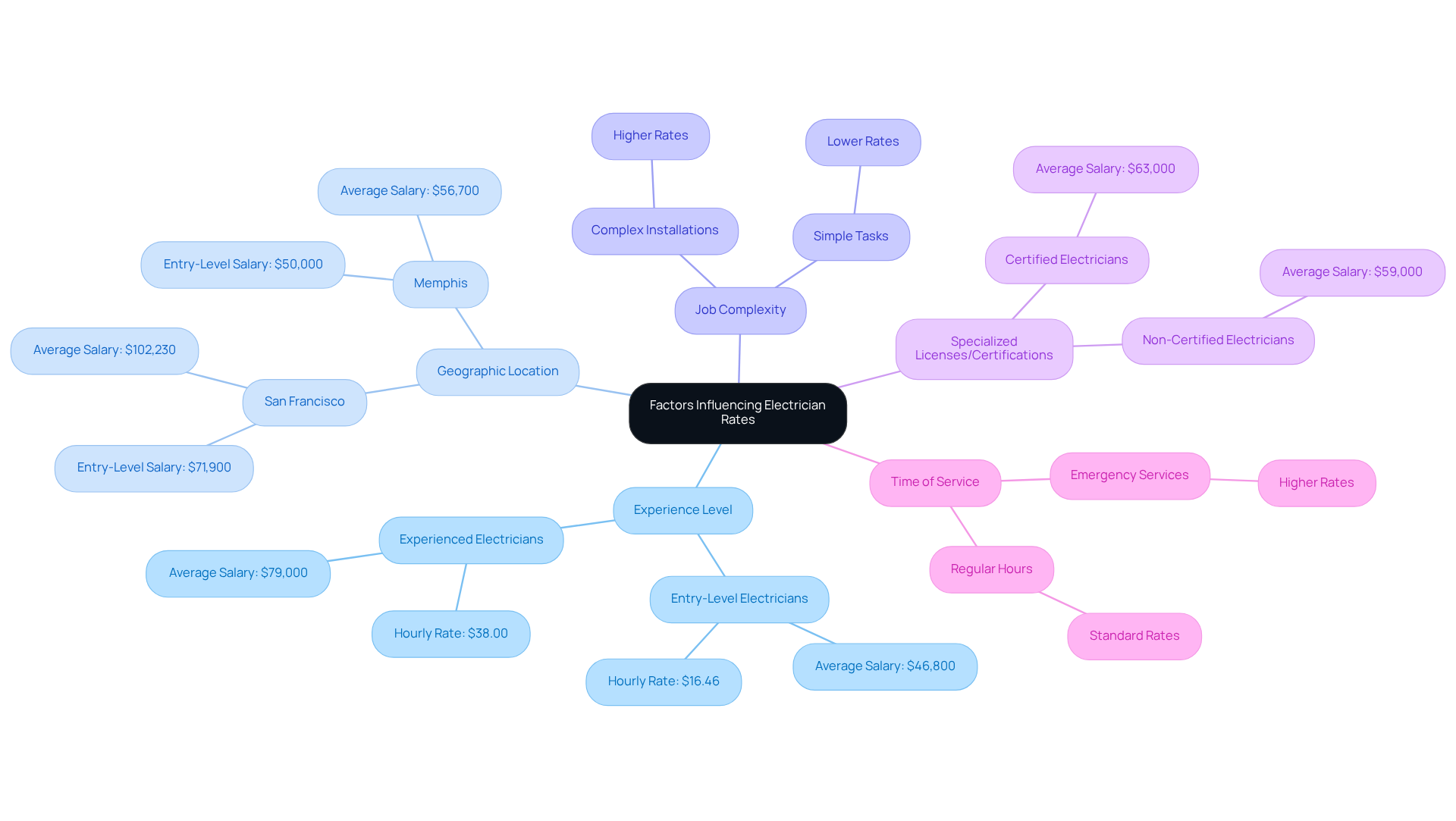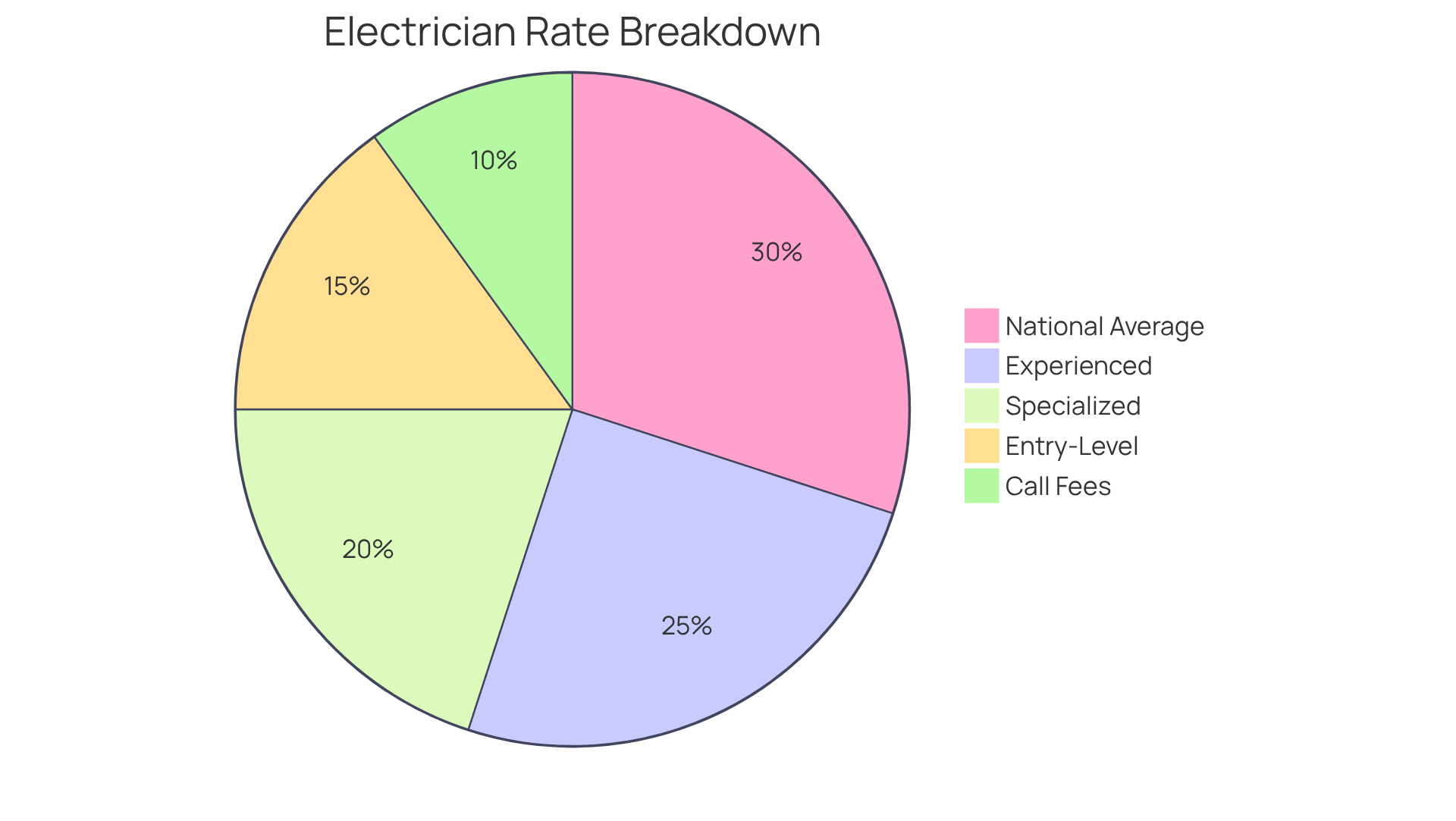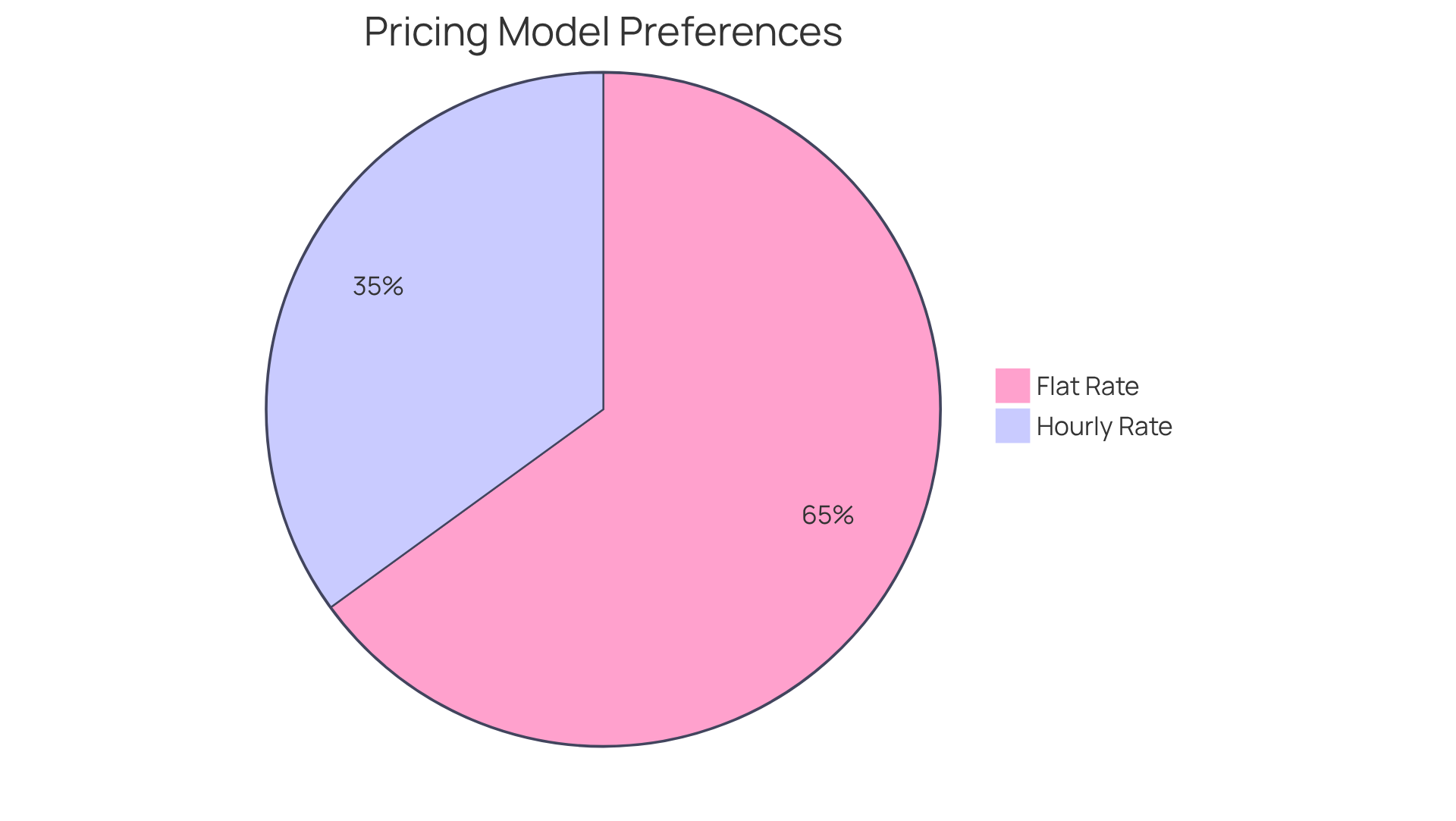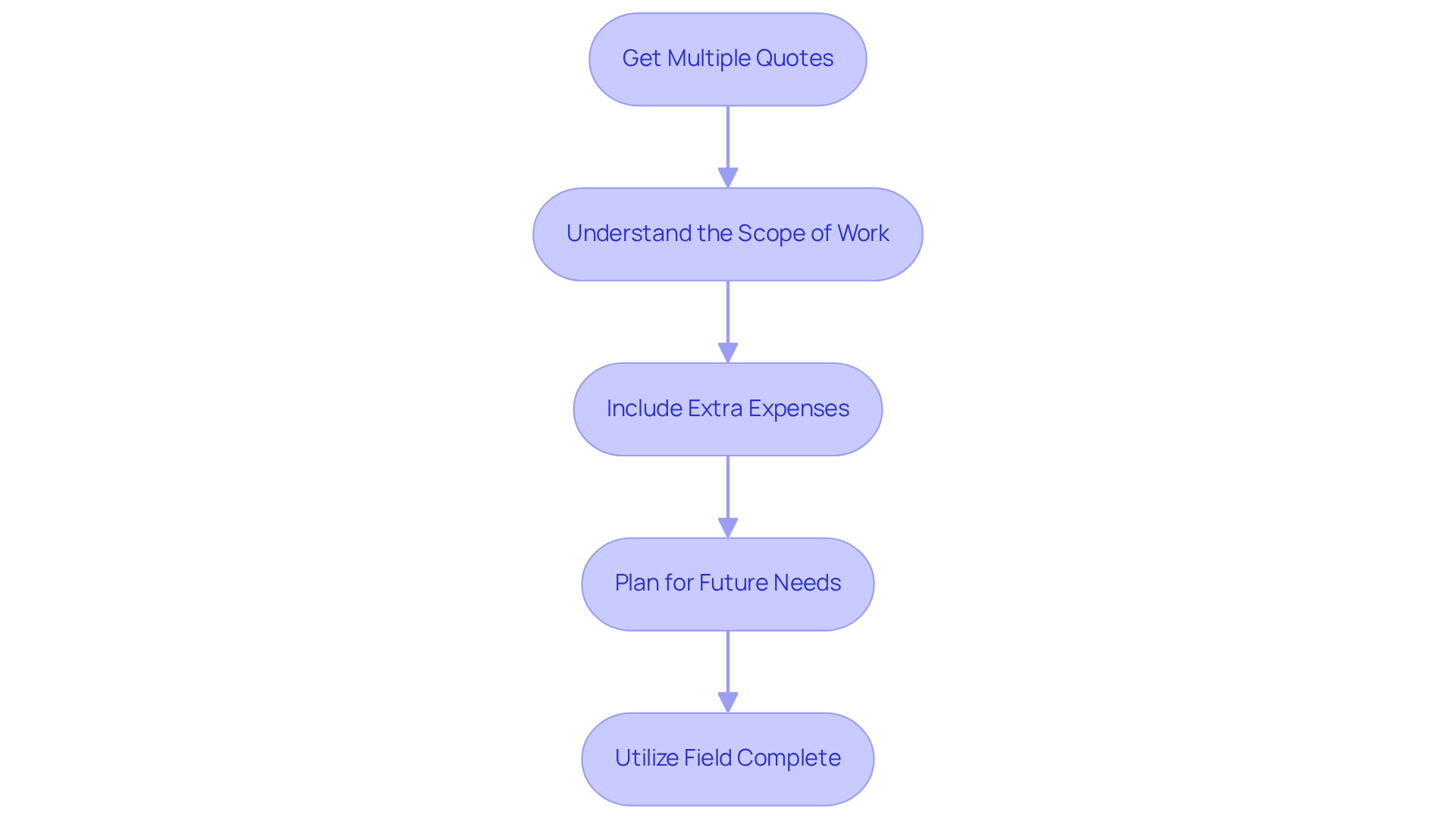Overview
Understanding the various factors that influence electrician rates per hour can be quite overwhelming for both clients and electricians alike. It’s essential to recognize that rates are not just numbers; they reflect the experience level, geographic location, job complexity, specialized licenses, and even the timing of services. This complexity can lead to confusion and frustration, making it challenging for clients to budget effectively and for electricians to price their services strategically.
Electricians typically charge between $50 and $100 per hour, but this range can vary significantly based on the factors mentioned. This variability can create anxiety for clients who want to ensure they’re making informed decisions while also feeling fair to the professionals they hire. It’s important to acknowledge that these rates are not arbitrary; they are a reflection of the skills and expertise that electricians bring to the table.
By gaining insights into average rates and the factors that influence them, clients can budget more effectively, alleviating some of the stress associated with hiring an electrician. For electricians, understanding these dynamics allows them to price their services in a way that reflects their value while remaining competitive in the market. This mutual understanding fosters a healthier relationship between clients and electricians, ultimately leading to more successful projects and satisfied customers.
Introduction
Navigating the complexities of electrician rates can often feel overwhelming, much like wandering through a maze. These rates can shift based on a variety of factors, including experience, location, and the intricacies of the job at hand. This article aims to shed light on the key elements that influence hourly charges, providing insights that empower both clients and electricians to make informed financial choices. Yet, with such a broad spectrum of pricing models available, how can one effectively budget for electrical services without encountering unexpected costs? It’s a challenge that many face, and understanding it is the first step toward finding peace of mind.
Explore Factors Influencing Electrician Rates
Electrician rates per hour can be a source of stress for many professionals in the field, fluctuating significantly based on several critical factors.
-
Experience Level: It’s understandable that electricians with more experience command higher electrician rates per hour. This reflects their advanced skills and efficiency. For instance, entry-level electrical workers earn around $16.46 per hour, while those with over 20 years of experience can make more than $79,000 annually. This disparity highlights the financial rewards that come with gaining expertise in the field, which can be both motivating and daunting.
-
Geographic Location: The geographic location where electricians work also plays a crucial role in determining electrician rates per hour. Urban areas often see higher prices due to increased demand and the cost of living. For example, electricians in San Francisco earn an average salary of $102,230 per year, significantly higher than those in lower-cost areas like Memphis, where the average salary is $56,700. This can create a sense of inequity for those in less lucrative regions.
-
Job Complexity: The complexity of the job can further affect electrician rates per hour. Simple tasks may be billed at lower rates, while intricate installations or repairs require more skill and time, leading to higher charges. This tiered pricing system allows professionals to accurately represent the worth of their skills, but it can also lead to confusion for clients trying to budget effectively.
-
Specialized Licenses or Certifications: Electricians with specialized licenses or certifications often charge higher electrician rates per hour for their work, as these credentials validate their advanced skills. Certified professionals earn an average of $63,000 each year, compared to $59,000 for their non-certified peers. This emphasizes the financial advantages of acquiring certifications, which can feel like a significant investment for many.
-
Time of Service: Electrician rates per hour may increase for emergency services or work performed outside regular business hours. These situations often require immediate attention and can disrupt standard scheduling, adding to the stress of managing a contracting business.
Understanding these elements is crucial for clients to plan their finances efficiently. It also allows contractors to validate their cost strategies in a competitive market. This is where Field Complete’s electrical contractor management software comes into play. It can assist professionals in managing these varying costs by optimizing their pricing approaches and enhancing operational efficiency.
Imagine having a tool that helps you navigate these challenges, allowing you to manage your team effectively while responding to the dynamic nature of the electrical industry. With the right support, you can focus on what you do best, knowing that your pricing strategies are in good hands.

Analyze Average Hourly Rates for Electricians
Electrician hourly charges in the U.S. can be quite confusing, and it’s understandable to feel overwhelmed by the considerable variation influenced by experience, specialization, and regional factors. Let’s break down some key insights into current pay rates to help you navigate this landscape with confidence:
- National Average: On average, electricians charge between $50 and $100 per hour. This range reflects a broad spectrum of expertise and service types, which can be daunting for homeowners trying to budget for electrical work.
- Entry-Level Electricians: If you’re just starting out in the field, electrician rates per hour might range from $25 to $40. This can be a cost-effective option for homeowners needing basic electrical work. Looking ahead, the median yearly income for entry-level electricians is projected to be $60,600 in 2025, providing a helpful baseline for understanding these hourly figures.
- Experienced Electricians: For those with several years of experience, the electrician rates per hour typically fall between $70 and $100. This reflects the advanced skills and knowledge they bring to the table, which can be invaluable for more complex projects.
- Specialized Offerings: Electricians who specialize in areas like renewable energy installations or complex system upgrades may charge electrician rates per hour that exceed $150. This is due to the advanced training and expertise required, which can make a significant difference in the quality of work.
- Call Fees: It’s also important to consider that a technician visit usually costs between $100 and $200. This fee typically covers the first hour of labor and initial diagnostics, so it’s essential for homeowners to factor this into their budget for electrical work.
These averages serve as a useful reference point for clients seeking electrical services and for electricians looking to develop competitive pricing strategies. Understanding these figures is crucial for effective financial planning and ensuring fair compensation for skilled workers. Remember, you’re not alone in this journey; many others are navigating similar challenges, and together, we can find the right solutions.

Compare Hourly vs. Flat Rate Pricing Models
Electricians often face a tough decision when it comes to choosing between electrician rates per hour and fixed pricing structures. This choice can significantly impact their work and client relationships, and it’s essential to understand the unique benefits each option offers.
Hourly Pricing: Imagine tackling a job where the duration is uncertain. This is where electrician rates per hour shine, as clients are charged based on the actual time spent. It’s particularly advantageous for unpredictable tasks, allowing electricians to address challenges as they arise. Many contractors find that electrician rates per hour ensure they’re compensated fairly for their time and expertise. This flexibility not only enhances the quality of work but also boosts client satisfaction, as electricians can adapt their approach to meet the specific needs of each project. For instance, Astley Electrical advocates for hourly charges, noting that this model fosters better communication and transparency, ultimately leading to improved project outcomes.
Fixed Charge Structure: On the other hand, a fixed charge structure offers a set fee for specific services, regardless of how long the job takes. This model provides clients with clear expectations about costs, which can be especially appealing for straightforward tasks. Moreover, flat fee structures can be more profitable for electricians who work efficiently, allowing them to increase their income by completing multiple jobs in a shorter timeframe. A recent survey revealed that over 11,000 homeowners prefer flat fees, highlighting its popularity among clients seeking predictability in their expenses.
Ultimately, the choice between hourly and flat fees hinges on the nature of the work and the preferences of clients. By understanding the unique requirements of each project and the expectations of their clients, electricians can make informed decisions about the most suitable pricing model. This balance between profitability and customer satisfaction is crucial for long-term success.

Budget for Electrical Services Effectively
Budgeting for electrical services can often feel overwhelming, especially when unexpected costs arise. Many contractors struggle with this challenge, leading to stress and uncertainty. To help you navigate this process with confidence, consider these essential steps:
-
Get Multiple Quotes: It’s always wise to gather quotes from several electricians. This not only builds trust in your final contractor choice but also reveals trends in pricing and services. By comparing at least three quotes for major projects, you can better understand normal pricing and ask informed questions, ensuring you don’t overpay or settle for subpar work.
-
Understand the Scope of Work: Clearly defining the work needed is crucial to avoid surprises down the line. When you provide detailed descriptions, technicians can offer precise estimates, covering all aspects of the job. A thorough quote should outline responsibilities for any issues that arise and include final cleanup, helping to prevent misunderstandings.
-
Include Extra Expenses: It’s important to factor in potential extra costs, such as permits, materials, and emergency assistance fees. Not all contractors include the same extras in their quotes, so ensuring that bids are comprehensive is vital. This includes accounting for inspections and disposal fees, which can add up quickly.
-
Plan for Future Needs: Thinking ahead can save you from financial strain when unexpected issues crop up. With the electrical construction industry projected to grow significantly, preparing for future upgrades or repairs is essential. By budgeting for these potential needs, you can avoid stress when challenges arise.
By utilizing Field Complete, HVAC contractors can simplify their business management processes, making scheduling, estimating, and payment collection much easier. This user-friendly software is designed to be accessible, even for those who may not be tech-savvy. It enhances transparency in budgeting and fosters trust between clients and contractors, leading to better project outcomes. By following these budgeting tips, you can ensure you’re financially prepared for electrical services, while electricians can position their pricing strategies more effectively. Remember, you’re not alone in this journey; with the right tools and support, you can navigate the complexities of budgeting with ease.

Conclusion
Understanding the complexities of electrician rates per hour can feel overwhelming for both clients and professionals in the electrical industry. It’s essential to recognize how factors like experience, geographic location, job complexity, and specialized credentials can influence these rates. This knowledge not only helps clients budget effectively for electrical services but also empowers electricians to set competitive pricing strategies that truly reflect their expertise and the value they bring to the table.
This article sheds light on average hourly rates, revealing the significant differences between entry-level and seasoned electricians, as well as how specialized skills can affect pricing. It also explores the nuances of hourly versus flat rate pricing models, highlighting the importance of choosing the right approach based on the specific nature of the work and client preferences. Moreover, we discuss effective budgeting strategies, encouraging clients to gather multiple quotes and prepare for potential extra costs, ensuring they feel financially secure as they embark on their electrical projects.
Navigating the intricacies of electrician rates requires a proactive mindset from both clients and contractors. By utilizing tools like Field Complete, which enhance management and transparency, and by staying informed about current trends and pricing structures, stakeholders can build trust and pave the way for successful project outcomes. Embracing this knowledge not only improves financial planning but also elevates the overall quality of service within the electrical industry.
Ultimately, it’s about fostering a supportive environment where both clients and electricians can thrive together.
Frequently Asked Questions
What factors influence electrician rates per hour?
Electrician rates per hour are influenced by several factors, including experience level, geographic location, job complexity, specialized licenses or certifications, and the time of service.
How does experience level affect electrician rates?
Electricians with more experience typically command higher rates due to their advanced skills and efficiency. For example, entry-level electricians earn around $16.46 per hour, while those with over 20 years of experience can earn more than $79,000 annually.
Does geographic location impact electrician salaries?
Yes, geographic location significantly impacts electrician salaries. Urban areas often have higher rates due to increased demand and the cost of living. For instance, electricians in San Francisco earn an average of $102,230 per year, while those in Memphis earn about $56,700.
How does job complexity influence electrician rates?
The complexity of the job affects rates; simpler tasks may be billed at lower rates, while more intricate installations or repairs require more skill and time, leading to higher charges.
What role do specialized licenses or certifications play in electrician rates?
Electricians with specialized licenses or certifications generally charge higher rates, as these credentials validate their advanced skills. Certified electricians earn an average of $63,000 annually, compared to $59,000 for non-certified electricians.
How does the time of service affect electrician rates?
Rates may increase for emergency services or work performed outside regular business hours, as these situations often require immediate attention and can disrupt standard scheduling.
How can professionals manage varying electrician costs effectively?
Professionals can manage varying costs by utilizing tools like Field Complete’s electrical contractor management software, which helps optimize pricing approaches and enhance operational efficiency.
List of Sources
- Explore Factors Influencing Electrician Rates
- Understanding Electrician Salary Per Hour: Key Factors and Strategies – Field Complete (https://fieldcomplete.com/blog/data-analytics-in-field-services/understanding-electrician-salary-per-hour-key-factors-and-strategies)
- Atto: Timesheet & Time Tracking Software (https://attotime.com/blog/electrical-contractor-industry-statistics)
- Electrician Salary: State-by-State Average Pay Rates in 2025 (https://servicetitan.com/blog/electrician-salary)
- Average electrician salary by state and experience in 2025 – Workiz (https://workiz.com/blog/electrician-average-salary)
- How Much to Pay Electricians in 2025: A Complete Guide (https://buildforce.com/resource/how-much-to-pay-electricians-in-2025)
- Analyze Average Hourly Rates for Electricians
- Electrician Cost Per Hour 2025: 8 Key Shocking Facts (https://aaastl.com/blog/electrician-cost-per-hour)
- How Much Does An Electrician Cost Per Hour? (2025) (https://homeguide.com/costs/electrician-cost-per-hour)
- Electrician Salary: State-by-State Average Pay Rates in 2025 (https://servicetitan.com/blog/electrician-salary)
- 2025 Electrician Cost | Get Free Estimates (https://thumbtack.com/p/electrician-prices)
- Compare Hourly vs. Flat Rate Pricing Models
- Flat Rate vs Hourly: What’s Better for Your Service Business? (https://servicefusion.com/blog/flat-rate-vs-hourly-whats-better-for-your-service-business)
- Is Fixed Price Better than Hourly Rate for Electrical Clients? (https://astleyelectrical.com.au/blog/fixed-vs-hourly-electrical-pricing)
- Ogimoto Laboratory: Balancing Power Supply and Demand – Gurobi Optimization (https://gurobi.com/case_studies/ogimoto-laboratory-balancing-power-supply-and-demand)
- Budget for Electrical Services Effectively
- Maximize Your Budget: The Importance of Getting Multiple Quotes for Roof Replacement (https://roof-crafters.com/learn/get-multiple-roof-replacement-quotes-best-value-budget)
- Electrical Contractor Industry Statistics Point Towards a Brighter Future in 2021 (https://jonasconstruction.com/electrical-contractor-industry-statistics)
- Should You Get Multiple Contractor Quotes? Here’s Why It Matters | Team Dave Logan (https://teamdavelogan.com/blog/why-it-matters-to-get-multiple-quotes)
- How to Create Accurate Cost Estimation Worksheets for Electrical Projects (https://buildforce.com/resource/how-to-create-accurate-cost-estimation-worksheets-for-electrical-projects)





